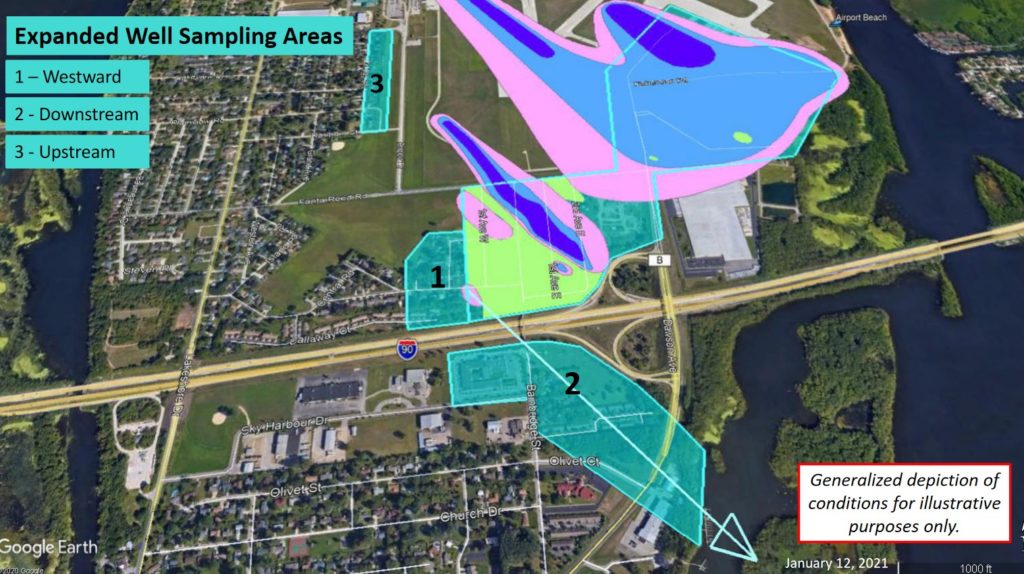PFAS in La Crosse
March 11th, 2021

There’s been a lot of talk landing in my inbox these days about the PFAS mess in the surface and ground water around the La Crosse Regional Airport, affecting private and public wells.
The City of La Crosse has sued:
PFAS? Welcome to our world in Minnesota:
That settlement was for $850 million, “settled” in 2018, but I think it was too little and too soon.
Meanwhile, La Crosse, WI is taking this seriously, and the City of La Crosse has sued the handful of those making and marketing and selling PFAS:
City Of La Crosse Files Lawsuit Calling Out 23 Companies For PFAS Contamination
And the City of La Crosse’s page:
Well Water Testing Around the La Crosse Regional Airport
More articles:
La Crosse files lawsuit against 23 chemical manufacturers over PFAS contamination
Calendars!! MN’s Nitrate rulemaking hearings
May 12th, 2018

There’s a rulemaking afoot, and rulemaking hearing. Usually rulemakings are the not-so-blind leading the blind, because by the time there’s a rule to comment on, the fix is in. It’s been decided how it will go, and the public comment period is just a box to check off. All the action occurs before it is released, the wrangling about language, the focus, all that is done by the agency in consultation with “stakeholders” who are typically the corporate sort that agencies regard as their “constituents” and there’s little public or advocate participation. That’s how it works. If we’re (we the people) are lucky, or if we really push for it, there’s an Advisory Committee, as authorized by Minn. Stat. 14.10:
I don’t see any evidence that it happened here. So… we have a proposed rule, and the comment period is now open, and hearings are being held in various spots in Minnesota.
There’s a hearing now scheduled for Red Wing (links to docs below), which was not in the original list:
Red Wing Nitrate Hearing
Tuesday, June 5
7:00 p.m. – 8:30 p.m.
Minnesota State College Southeast
308 Pioneer Road
Red Wing, MN 55066
Here’s the original schedule:
1:00-6:00 PM on Monday, July 16, 2018
Robert Boeckman Middle School
800 Denmark Ave
Farmington, MN 5502410:00 AM – 4:00 PM on Wednesday, July 18, 2018
Stewartville Civic Center
105 1st St E
Stewartville, MN 5597610:00 AM – 4:00 PM on Thursday, July 19, 2018
Minnesota West Community and Technical College
1450 College Way
Worthington, MN 5618710:00 – 4:00 PM on Wednesday, July 25, 2018
River’s Edge Convention Center
10 Fourth Avenue South
St. Cloud, MN 563019:00 AM – 3:00 PM on Thursday, July 26, 2018
American Legion
900 1st St E
Park Rapids, MN 5670
The “draft” rule has been released for public comment, but there was a first draft rule from June 2017. Below is the official draft, revised in April, 2018:
|
Groundwater Protection Rule (PDF: 328 KB / 26 pages)
Statement of Need and Reasonableness (SONAR) (PDF: 3.18 MB / 164 pages)
Notice of Hearing (PDF: 85 KB / 3 pages)
SONAR Appendixes (PDF: 15.73 MB / 208 pages)
COMMENT PERIOD:
- Initial Comment Period closes on July 31, 2018 at 4:30 p.m
- Rebuttal Comment Period: August 1, 2018 through 4:30 p.m. on August 7, 2018
Here’s where to send comments (note SEND TO OAH, and not Dept. of Ag):
https://mi1111esotaoah.granicusideas.comldiscussio11s/
or
Administrative Law Judge Palmer-Denig
Office of Administrative Hearings
P.O. Box 64620
Saint Paul, Minnesota 55164-0620
There are more specific instructions for filing comments on the OAH site:
Instructions: To comment, scroll down to “Topic: Submit a Comment” and click “View Topic.”Please make sure that your comments:
- Identify the specific part or subpart of the rule you are addressing;
- Specify whether you support or oppose the proposed rule language;
- Give reasons for your views; and
- Be specific and offer language changes to solve the problems you identify.
Attachments: Commenters may attach up to three documents to a comment. Allowed attachments include PDFs, spreadsheets, and word documents. Please include your name and contact information on all attachments.
I can’t stress enough how important it is to be specific, and to refer to parts of the rule that you’re commenting about. Vague rah-rah OR blah, blah, comments will have no impact, nor will form letters or postcards. Once more with feeling, be specific, and to refer to parts of the rule. Have at it!
STrib pulls biomass expose
June 26th, 2010
The STrib had posted a thoughtful, balanced piece about the problems with “biomass,” actually discussing some of the problems with biomass — and biomass is a burning issue here in Minnesota. And then, with the blink of an eye, it’s GONE… GONE… GONE!
Here it is, with a related NYT blog post:
Net Benefits of Biomass Power Under Scrutiny
Q & A: Woody Biomass Pros and Cons
And in full so it can’t be disappeared, from the New York Times:
Net Benefits of Biomass Power Under Scrutiny
By TOM ZELLER Jr.
Published: June 18, 2010“It’s way better than coal,” Mr. Wolfe said, “if you look at it over its life cycle.”
That, critics say, is because it is not as climate-friendly as once thought, and the pollution it causes in the short run may outweigh its long-term benefits.
Read the rest of this entry »
